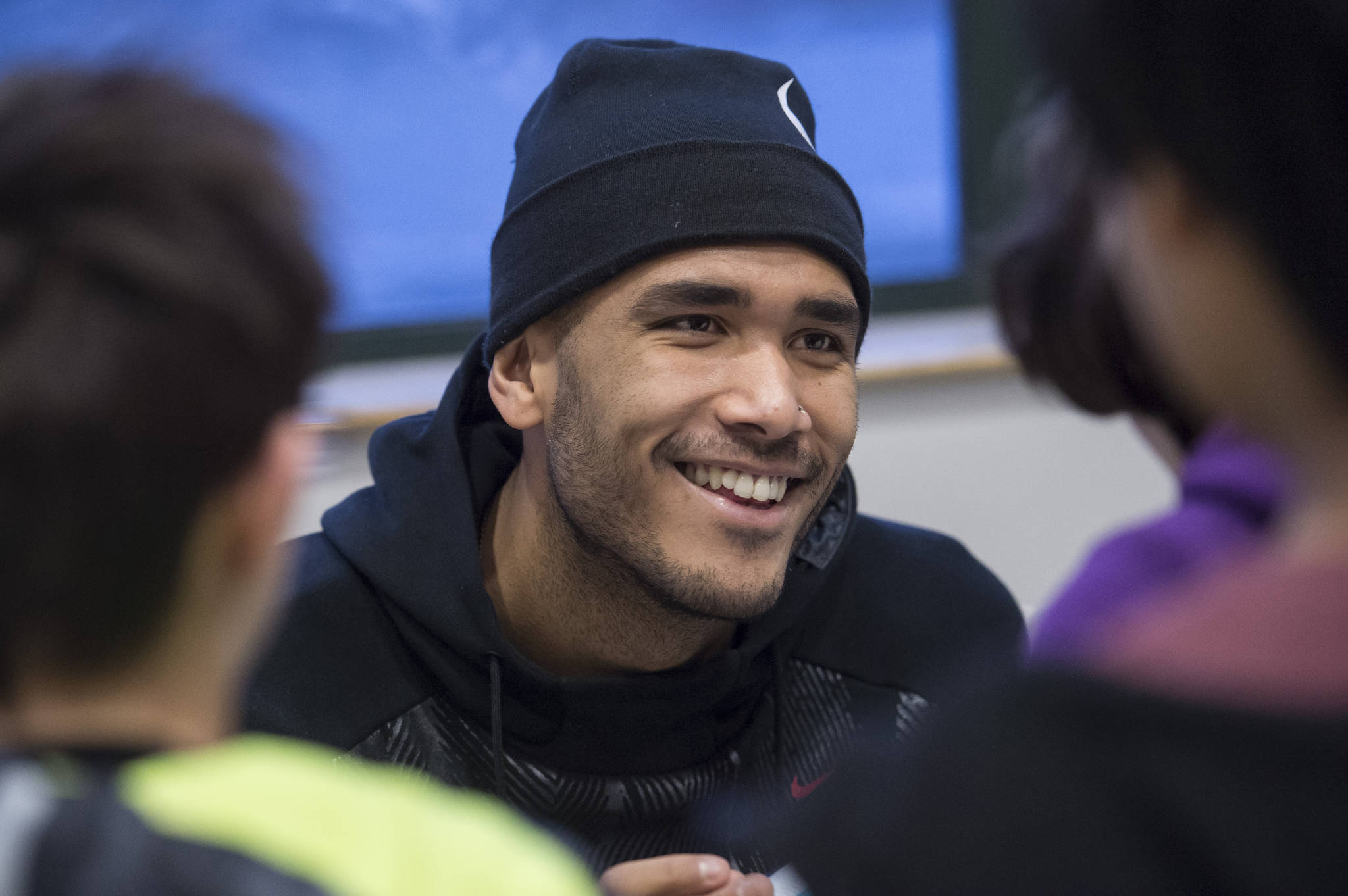Damen Bell-Holter doesn’t actually think about basketball much these days. Or, rather, not nearly as much as he did as while growing up in Hydaburg or going to school at Oral Roberts University.
The 28-year-old Haida man — who retired from professional basketball a few years ago — thinks mostly about Southeast communities. It’s his job now. The director of youth and community development at Sealaska Corp., Bell-Holter spent part of last summer visiting Southeast communities, opening the minds of youth through basketball camps while opening his mind to community members.
[Southeast-raised basketball star leads next generation at CCTHITA , Sealaska camp]
“I meet with the mayor, I meet with the tribal council, I meet with the principal, I meet with the coaches, I meet with the teachers,” Bell-Holter said of his visits. “I go into every single classroom.”
Now, it’s Bell-Holter, and several other prominent Native American young adults, who will be doing the talking at the “We Belong Here,” a free youth leadership and basketball camp hosted by Sealaska and several other Juneau organizations on Monday, Tuesday and Wednesday at Thunder Mountain High School and Elizabeth Peratrovich Hall.
The Empire spoke with Bell-Holter on Friday by phone to talk about the camp and his vision for strengthening Southeast peoples. This interview has been edited for length and clarity.
[Spreading holiday cheer, one basketball at a time]
Juneau Empire: How did the “We Belong Here” come together?
Damen Bell-Holter: At first we had just thought about Gold Medal week and how there wasn’t much going on. Originally, when I (had) just moved back in April (2018) and took this position with Sealaska, one of the things I said was we need more youth conferences and youth gatherings. I’ve been fortunate to travel the country for probably eight or nine years and spoke at a number of conferences and I’ve seen that’s what makes a difference is when you’re having opportunities for kids to come together and network.
Empire: The camp signup talks about developing leadership through sports, advocacy, art and culture. What kind of advocacy would you like Alaska youth to be a part of these days?
Bell-Holter: Just understanding everything from the budget cuts to what’s going on in our communities from the high suicide rates, the violence against women — 93 percent of Alaska Native women has experienced violence in their lives. There’s a lot of things that go on in our state and our communities that need to be talked about. I think young people need to understand that they have a voice.
Empire: What does the name “We Belong Here” mean to you? Why did you chose that name?
Bell-Holter: Just inclusiveness. Especially today, I travel around Southeast, I travel around the country, I work with all kids of different ages. There’s a lot of places where kids don’t feel included. There’s a lot of kids who feel they don’t belong. A lot of our young people are having identity problems and that’s a problem of we’re not teaching our young kids healthy relationships. We’re not teaching how to treat people the right way. That’s why you see bullying, that’s why you see suicide.
Empire: Last year you were named as Sealaska’s Director of Youth and Community Development, how has the first year on the job been for you?
Bell-Holter: It’s been good. It’s new, but everything I’ve been doing in a sense for a long time. But now it’s with a more structured approach and I actually have resources. … What I’ve been doing mostly is just going out and consulting with our communities and asking questions, finding out what’s working, finding out what’s not working, because when I really started to think about it, it’s all community development. We’re trying to develop all of our communities, all of our people, not just our kids. I’ve gone to the communities, I’ve identified a lot of gaps and I’ve identified what we can do better.
Empire: When you talk about the certain gaps that you see, is there one that stands out the most?
Bell-Holter: I travel around and there’s a lot of these communities of solid role models, strong men who are setting the right example. Then there’s a lot that aren’t. Something I’ve tried to identify and something I’ve always known is that our men have to do healing. … If we heal our men, if we raise the bar for our men, then we tackle the problem of single mothers, the domestic violence goes down. There’s a lot of things that all begins and ends with our men. I have an opportunity to influence men my age, younger than me and older, so I’m trying to push for that and I’m trying to create a network throughout Southeast of strong, positive, safe men.
Basketball clinics and workshops go Monday and Tuesday 8 a.m.-4:30 p.m at TMHS. Keynote speaker Jesse LeBeau and dance and musical groups take the EPH stage Wednesday from 3-7 p.m. In addition, comedian Tonia Hall will perform on Monday at 6:30 p.m. at EPH. Register for the gathering, open to grades 4-12, online at sealaska.com or at the door Monday morning.
• Contact sports reporter Nolin Ainsworth at 523-2272 or nainsworth@juneauempire.com. Follow Empire Sports on Twitter at @akempiresports.

